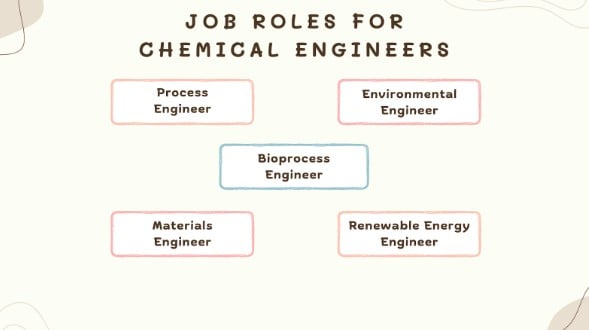Think Biomass Is Just Waste? Know How Chemical Engineers Turn It into Energy, Ethanol, and Equity

Blog / July 28, 2025
B.Tech. Chemical EngineeringB.Tech. Chem. Engg.Energy is the most essential thing that is required for the world to function. We are using fossil fuels like coal for energy production even centuries before the invention of the steam engine. Some studies have found that the oldest intentional use of black coal dates back to 25,000 to 23,000 years BC. Not only this, but archeological evidence in China supports surface mining of coal and domestic consumption after around 3490 BC. Well, this is enough to establish the fact that humankind has been using hydrocarbon deposits for centuries to fulfill its demand for energy.
Since the Industrial Revolution, the use of coal, oil, and gas to power factories and other utilities has only gone up. However, we are standing at the door of two critical problems. The first is continuously depleting reserves of these energy sources and the second is gases produced after the use of it, harming our environment and ecosystem at a concerning scale.
Growing concerns about saving the environment and reducing the use of fossil fuels have prompted the world to consider alternative, less-polluting sources of energy. This is where bioenergy and biomaterials have emerged as an excellent option.
World’s top economies, including India, have introduced Bioenergy programs and emphasized different initiatives like ethanol-blending to reduce the dependency on hydrocarbon deposits.
As the countries are opting for these alternative bioenergy sources, the demand for professionals who understand this concept, work with it, and enhance it is expected to rise in the upcoming years.
Growing Importance of Bioenergy and Biomaterials: India’s Current Status and Future Plans
Bioenergy is a kind of renewable & sustainable energy that is derived from recently living organic material (commonly called biomass) such as plants, trees, and waste. This biomass can be transformed into heat, electricity, as well as transportation fuels. On the contrary, Biomaterials are materials (either natural, synthetic, or a hybrid of both) that are developed to interact with biological systems for varied specific purposes.
Now, when the concern for environment-friendly energy consumption is growing, the concept of converting waste to biomaterials, and biomass to bioenergy, is making its way in the discussion very significantly.
As per a report by PwC, “The available biomass in India currently stands at 750 million metric tons (MMT)/year with surplus biomass availability of 230 MMT/year. At present, an estimated 32% of total primary energy use in India is principally derived from biomass, and over 70% of Indians depend on biomass for their energy use across the value chain.”
According to an article published in Fortune India, biomass power, cogeneration, and waste-to-energy projects now account for less than 3% of India's installed power generation capacity. But the future is looking brighter and promising because the International Energy Agency (IEA) forecasts that once government regulations are in place, bioenergy may provide 130 million tons of oil equivalent of usable energy by 2040, accounting for around 15% of India's total energy consumption at the time.
Considering India’s high potential in the bioenergy and biomaterials sector, Finance Minister Nirmala Sitharaman announced schemes on bio-manufacturing and bio-foundry to support the renewable energy production and sustainable next-generation goods. The new framework has the potential to encourage India's sustainability commitment for achieving net-zero goals by 2070.
The announcements by the Finance Minister are in line with the National Bioenergy Program for 2021 to 2026, announced by the Ministry of New and Renewable Energy. The MNRE has released the phase-1 budget for this program of INR 858 crore to boost three bio-energy components in India:
- Waste to Energy Program
- Biomass Program and
- Biogas Program
India’s Focus on Ethanol Blending: Achieving Sustainability by Boosting Its Own Economy
The Ethanol Blended Petrol Program was introduced by the Government of India in 2003 with the objective of achieving sustainability, lessening reliance on fossil fuels, and decreasing carbon emissions. But, for years, this was put in a cold basket. In recent years though, the government revived this initiative through the National Policy on Biofuels (2018) as amended in 2022, and set a target to accomplish 10% blending by 2022. But, this was achieved ahead of the expected time frame, leading to an ambitious goal of 20% ethanol blending by 2025. And as per a PIB Notification, the number has reached 17.89% as of 28th Feb 2025.
This program has shown exemplary results. India imports almost 87% of its crude oil needs, which makes the country vulnerable to price fluctuations in the global market and geopolitical relations with the supplying countries. The EBP program is a key step towards being more self-reliant and has shown exemplary results, according to a press release of the PIB:
- Savings of ₹1,06,072 crores in foreign exchange
- Reduction of CO2 emissions by 544 lakh metric tons
- Substitution of 181 lakh metric tons of crude oil and
- Public Sector Oil Marketing Companies disbursed ₹1,45,930 crore to distillers and ₹87,558 crore to farmers.
Important Role of Bioenergy Engineering in India: Chemical Engineers Specialized in Bioenergy and Biomaterials
Till now, it is firmly clear that the world is heading toward renewable energy sources, especially bioenergy and biomaterials, at a significant speed. To make this progress more rapid, efficient, and advanced, the chemical engineers who have expertise in bioenergy and biomaterials engineering are extremely important.
Chemical engineering in bioenergy and biomaterials has a great future prospect, considering the demand for professionals in this field is expected to go upwards. They are at the forefront of developing technologies in this sector.

Students willing to pursue chemical engineering in biomaterials and bioenergy can work across a diverse span of job roles and industries:
Job Roles
- Process Engineer
- Research Scientist/Engineer
- Environmental Engineer
- Bioprocess Engineer
- Materials Engineer and
- Renewable Energy Engineer
Top Industries
- Renewable Energy Companies
- Biotechnology and Pharmaceutical Companies
- Materials Science Companies
- Environmental Consulting Firms and
- Government Agencies and Research Institutions
Shaping the Innovative Minds for a Sustainable Future: Shiv Nadar University (Institution of Eminence) Offers Specialized B.Tech. Program
Given the anticipated increase in demand for bioenergy engineering in India, the School of Engineering has designed a unique B.Tech. in Chemical Engineering with specialization in Bioenergy and Biomaterials program. The curriculum for the course has been developed via rigorous cooperation between distinguished faculty and industry leaders.
The four-year undergraduate program aims to provide students with theoretical and practical understanding of the design, development, operation, and maintenance of chemical engineering and technology processes. Its goal is to develop highly skilled engineers who can confidently address difficulties in sustainability, waste valorization, and renewable energy.
The electives are:
- Industrial Pollution & Waste Management
- Waste to Biomaterials
- Biomass Conversion to Bioenergy and
- Microreactor Technology for Biofuel Production
Shiv Nadar University integrates chemical engineering concepts with alternative fuels, environmental science, and materials engineering to provide a unique circular economy and green energy solutions.
Conclusion
As the world is moving toward bioenergy and biomaterials as alternatives to non-renewable energy sources, the role and demand of bioenergy engineering in India and other countries of the world are going to rise. The government policies supporting the production of bioenergy and decreasing the dependency on fossil fuels, specifically imported crude oil, are shaping the direction for a sustainable future and aim to achieve the net-zero emission target by 2070.
Gear up and explore the B.Tech. in Chemical Engineering with specialization in Bioenergy and Biomaterials program at Shiv Nadar University. Admissions are open, and seats are filling quickly. Apply today and secure your seat!
FAQs
What are the eligibility criteria for admission to chemical engineering in bioenergy and biomaterials?
The candidate must have the Physics, Chemistry, and Maths aggregate of at least 65%.
How much can a chemical engineer earn in India?
Generally, the initial salary can range between 4-8 lakh rupees annually for chemical engineers in India.
Which entrance exam should students target for admission in B.Tech. program?
JEE Main is the widely accepted entrance exam for admission to B.Tech. Apart from this, Shiv Nadar University also offers admission through CUET + interview and SNUSAT + APT.